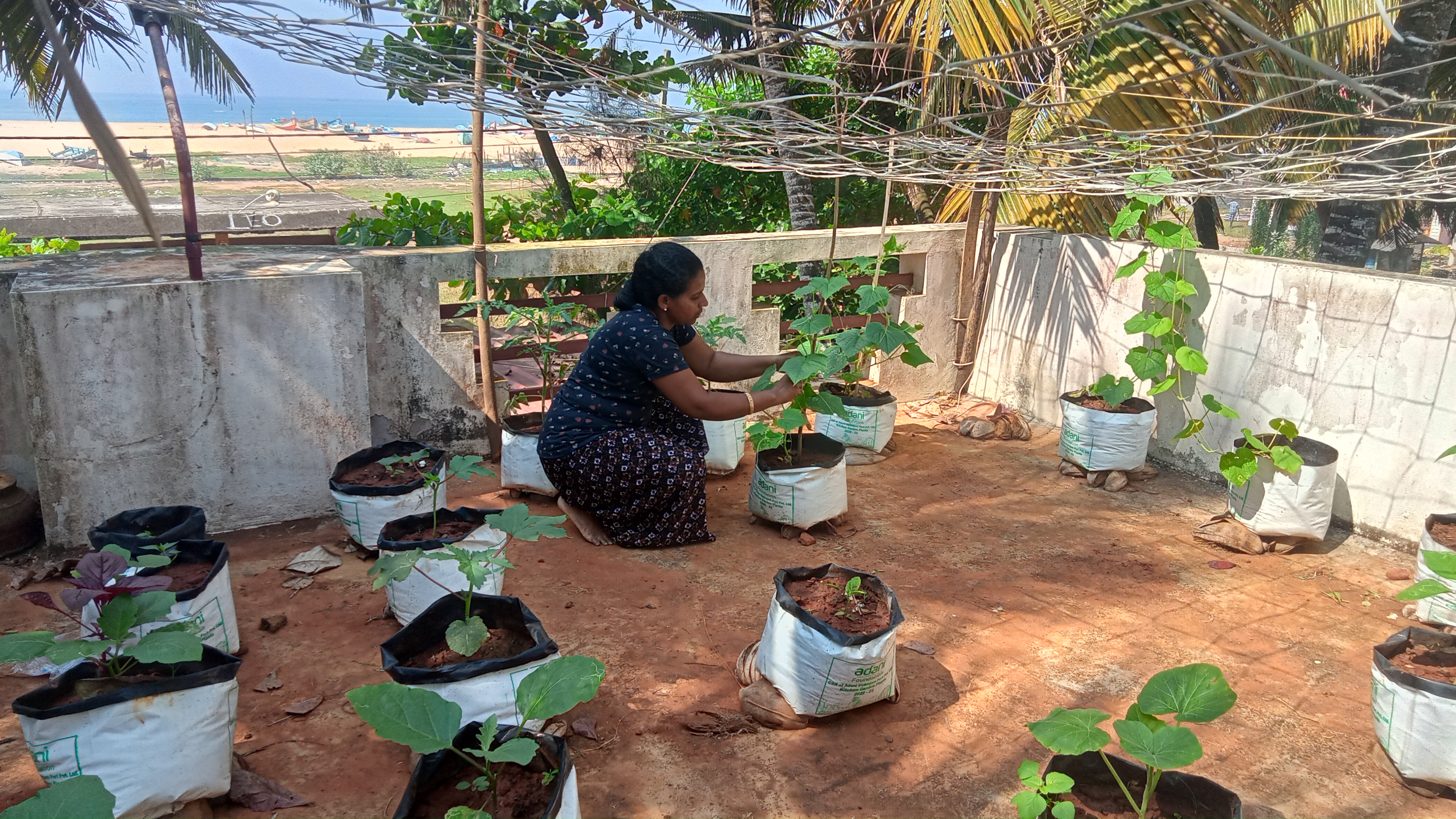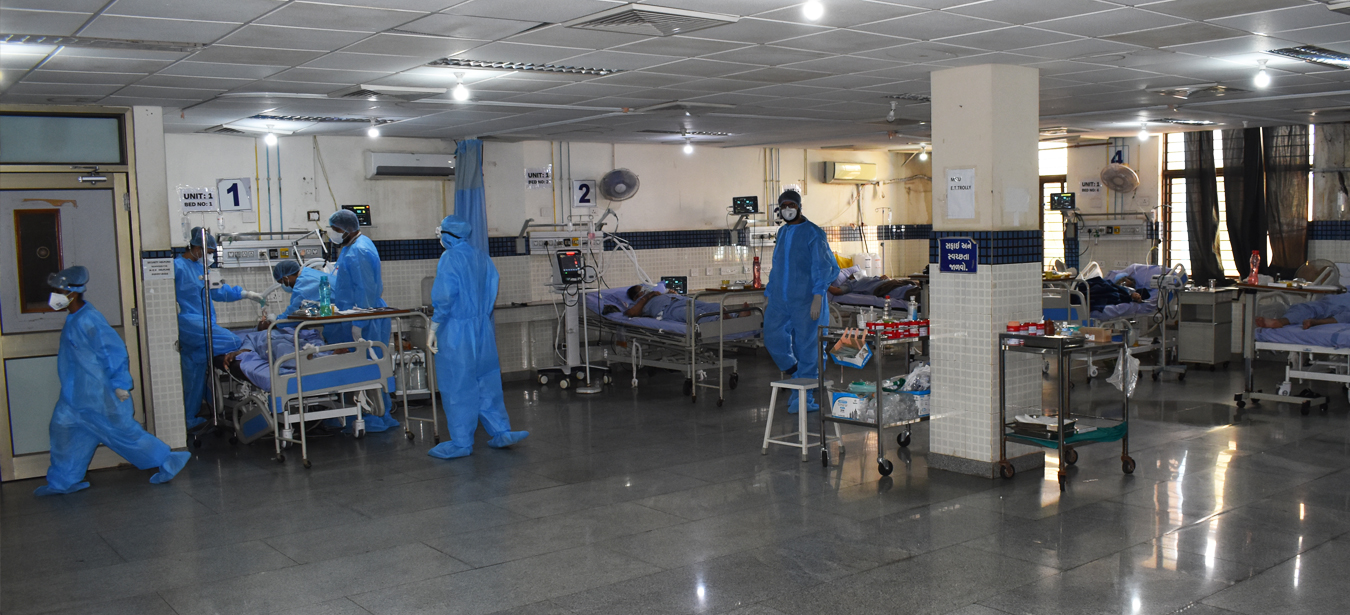.jpg)
We, at the Adani Foundation, are driven by a commitment to work towards enhancing the socio-economic status of underserved communities and positively touch as many lives as possible. We have been part of multiple social development programmes the Foundation has been implementing in Vizhinjam, Kerala, to bolster growth of communities. It is heartening to witness the outcome of our efforts in the form of transformative development that is unfolding at the grassroots.
Among the multiple impactful initiatives that the Foundation has been running in the region is the SEVAH kitchen garden project, which was introduced following comprehensive field studies that examined vegetable farming practices and consumption habits of locals in urban Vizhinjam. Our research revealed critical issues: seasonal vegetables – a major consumer item - were often sourced from across the state border and mostly contained pesticide residues exceeding permissible limits by three to five times*. Moreover, the Regional Cancer Center in Trivandrum reported a significant increase in cancer cases, from 11,191 in 2020-21 to 15,324 in 2022-23 — a 36% rise! This highlights the fact that fruits and vegetables, which are infused with high amounts of pesticides and fertilizers, are one of the major factors that are contributing to this rise in cases.
These factors indicated the need for a homestead-based kitchen garden which would be sustainable within a minimum area available for each family on front, backyards or rooftops. Based on these concerns, the Adani Foundation launched the SEVAH or the ‘Safe to Eat Vegetables for All Homes of Vizhinjam’ programme in Vizhinjam with a view to promote sustainable kitchen gardens that locals could run in their homes. The primary objective of this intervention was clear: to make the households self-reliant in cultivation and consumption of seasonal vegetables, thereby enhancing their nutritional status. It would also help them earn an additional income, over and above their occupations, from the sale of the surplus produced

Thus, the pilot project was introduced in 2020 with 260 members, primarily women. The Foundation established a farm school in Vizhinjam, spread across 5.2 acres, where it started training members in agricultural practices like vegetable cultivation, vermicomposting, usage of organic input in cultivation, seedling production and plant protection. Today, this farm school has become a crucial hub for seedling production and organic input supply, directly benefiting the community.
.jpg)
Over the past four years, the SEVAH initiative has grown exponentially, and today, it covers more than 1,760 members organized into 88 groups! The members cultivate vegetables such as bottle gourd, snake gourd, brinjal, clusterbeans, yard long beans, green chillies, spinach and tomatoes in their kitchen gardens.
.jpg)
Vanitha Karshika Karmasena, a women’s enterprise group established by the Foundation, is the core body managing the farm school and implementing the SEVAH project. They provide essential organic inputs and oversee crucial activities such as seedling planting and vermicomposting, and later distributing seedlings and other resources to the members.
Once seeds are distributed among members, our teams conduct regular meetings to discuss stages of plant growth in these kitchen gardens. We hold fortnightly review meetings, in which members share updates on their gardens and seek advice on plant health. Our teams facilitate resolving queries by agricultural experts from renowned institutions like Krishi Vizhinjam Kendra and Kerala Agricultural University.

During these meetings, members contribute a small thrift amount, which is deposited for future cultivation cycles. Towards the end of one cultivation cycle, the collected amount is used as seed money for the next cycle, which generally lasts up to five months. This not only fosters financial discipline among members but also empowers them to collectively reinvest in their kitchen gardens.
While working on this project, we have come across many remarkable individuals who became a crucial part of our journey and have been instrumental in taking the project to newer heights. One such inspiring woman is Raji Mukkola who has been associated with project since its inception. She joined the Adani Foundation in 2018 as a SuPoshan Sangini (community-level volunteer) of the Foundation’s SuPoshan initiative, which aims to address Malnutrition and Anemia in children aged 0-5 years, adolescent girls, and pregnant and lactating women. Currently, she is the kitchen garden coordinator of the project and is credited with having mobilized 160 women from her community to join the project.
Sharing her experiences, Raji says, “Resolving queries and helping out people who are new to the project give me a deep sense of happiness and satisfaction.” She adds that since the SEVAH project came into inception, the monthly budget of members’ households allocated for the purchase and transportation of seasonal fruits and vegetables has gone down drastically. On an average, each household is saving up to Rs 2,000 per month.

At the Adani Foundation, we believe in a community-driven approach to run our interventions, and the SEVAH initiative is a testament to this belief. Through the collective participation and collaboration of community members, this project is fulfilling its mission of fostering sustainable development.
Last month during the festival of Onam, we organized a kitchen garden fair, in which 700+ members of SEVAH came together to sell their surplus produce. The response we received was overwhelming. Members sold over 2,040 kilograms of vegetables, earning a total revenue of over Rs 1,20,000!
A highly localized solution to a pressing issue, the SEVAH kitchen garden programme has proved to be a game-changer for locals. It has not only transformed their consumption pattern but also benefited them economically besides forging stronger bonds among community members through sharing of the surplus with their neighbours.
The SEVAH initiative is a testament to the Adani Foundation's dedication to improving the socio-economic status of underserved communities and creating a healthy and sustainable future for them. We are proud to be associated with a project which has truly created a positive impact at the grassroots.
*Study: Pesticide residues analysis in vegetables in 2020 -safe to eat project on pesticide residue Analysis OCT 2023–Report Kerala Agricultural University.











